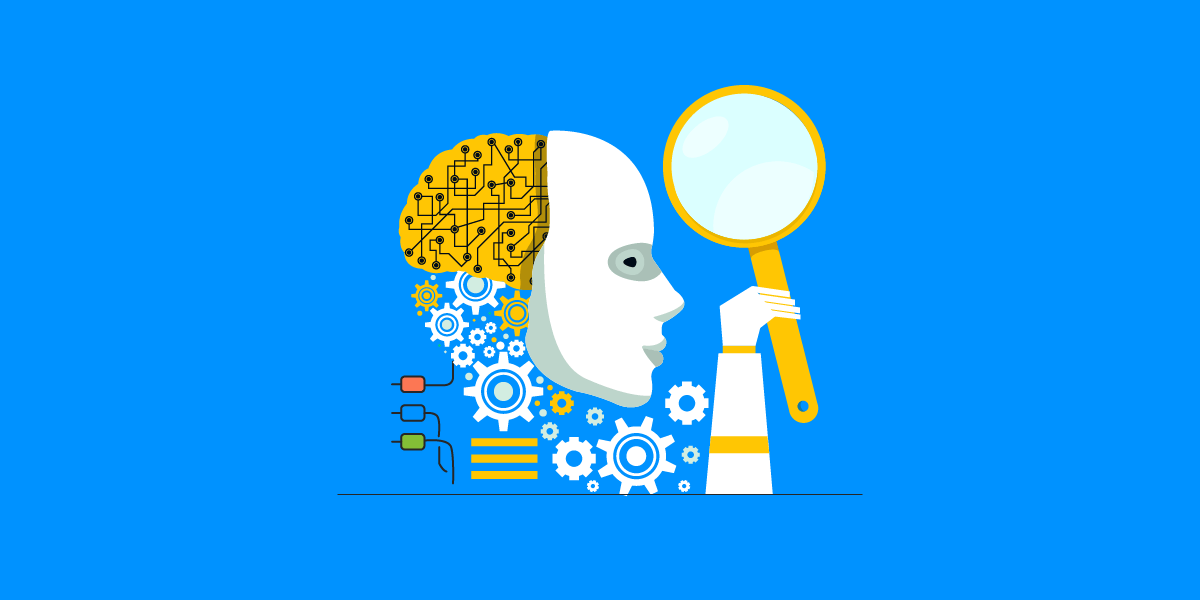Top AI Technology Trends For 2021 and Upcoming Years
AI technology trends are all the hype of recent times. It is fascinating how AI is influencing so many sectors of different industries.
Ever since the advent of Artificial Intelligence, the fundamentals of Industries started to change for the better. Now, every other AI development company, irrespective of their industry-type, wants in on this one miracle of technology.
The extent of the popularity of AI is that, According to SemRush, the AI market globally is predicted to increase in the next few years, reaching a $190.61 billion market value in 2025.
Another AI 2021 prediction statistics shown by Gartner states that by 2021, as many as 15% of customer service interactions worldwide will be fully powered by AI.
According to artificial intelligence growth statistics, the global GDP will grow by $15.7 trillion by 2030.
That’s why companies are integrating AI technologies to achieve their business goals.
To witness the exponential growth and latest AI developments in industries like Medical & Healthcare, Banking & Finance, Transportation, Retail & Commerce, Social Media, Manufacturing, and Business, we have dissected the latest AI trends into specific industries.
Why Is Artificial Intelligence A Disruptive Technology?
The scope of artificial intelligence is vast and that’s why it is a key empowering agent for disruptive innovation that prompts game changing products and services ready to serve low-end or unserved purchasers and relocate to the mainstream market.
As automation gradually is turned into sophistication, there’s no doubt that AI is currently in the process of disrupting the industry and markets.
This disruptive AI technology is a main thrust behind the disruptive innovation that we are presently witnessing.
For instance, AI empowered the sharing economy as a new business model where people can share their own resources with others as administrations to utilize these resources and to create benefits. This model is effectively applied in various domains, for example, ride sharing, smart prototyping, smart grids, and so on.
What Are The Emerging Technologies In AI?
Generative AI
The latest innovations in artificial intelligence have permitted numerous organizations to create algorithms and instruments to generate 3D and 2D pictures automatically. These calculations basically structure Generative AI, which empowers machines to utilize things like content, sound, and images to make content.
Generative AI, the latest innovations in artificial intelligence can likewise help in medical care by rendering prosthetic limbs, organic molecules, and different things from scratch when activated through 3D printing, CRISPR, and different other potential advances. It can likewise empower early distinguishing proof of possible malignancy to more effective treatment plans.
For example, on account of diabetic retinopathy, generative AI offers a pattern based theory as well as constructing the scan and creating content, which can assist with informing the doctor’s next steps.
Federated Learning
As indicated by Google’s research paper named Communication-Efficient Learning of Deep Networks from Decentralized Data, federated learning is characterized as a learning method that permits users to altogether procure the benefits of shared models prepared from rich information, without the need to centrally store it. In more technical speech, it disseminates the ML process over to the edge.
Medical associations for the most part are unable to share information because of privacy restrictions. Federated learning can help address this concern through decentralization by eliminating the need to pool information into a single area and preparing in various cycles at various sites.
Neural Network Compression
Generally, a neural network contains far more weights, represented at higher precision than are required for the specific task, which they are trained to perform. If we wish to bring real-time intelligence or boost edge applications, neural network models must be smaller. For compressing the models, researchers rely on the following methods: parameter pruning and sharing, quantization, low-rank factorization, transferred or compact convolutional filters, and knowledge distillation.
With the increasing size of the deep neural network for carrying complex computation, the storage needs are also rising. To address these issues, researchers have come with an artificial intelligence future idea and technique called neural network compression.
A neural organization contains undeniably more loads, addressed at higher accuracy than are needed for the particular assignment, which they are trained to perform. If we wish to bring real-time intelligence or boost edge applications, neural organization models should be smaller. For compressing the models, researchers depend on the accompanying strategies: boundary pruning and sharing, low-rank factorization, and knowledge refining, among others.
So, here are some amazing AI Technology Trends bearing witness to the opportunities it brings into these sectors, and also the impact of AI in 2021.
Technologies Used With AI
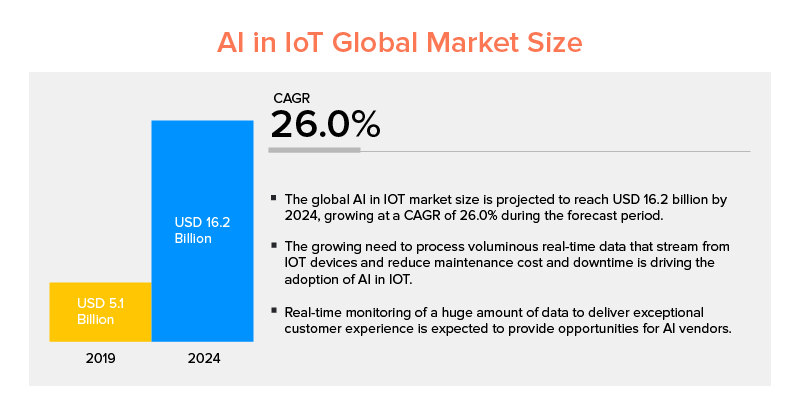
1. Internet of Things
AI in IoT is beneficial for both real-time and post event processing. In the former one, AI helps in identifying patterns in data sets and running predictive analytics. While in Real-time processing, it assists in giving quick responses to conditions and collecting knowledge of decisions about those events, for example, remote video camera capturing images of license plates for the parking payments.
There is a whole world out there where integration of AI in IoT connects every device with each other to enable them to perform additional functions.
2. Blockchain
Blockchain is another hyped technology which has created momentum in all industries. Now AI with Blockchain is simply the best of both worlds. It is so, for you to get benefits such as Better transactions, high-quality data, decentralized intelligence, lower market entry barriers, greater transparency, improved artificial trust provided by blockchain app development.
The impact of AI on Blockchain is such that we only expect this partnership to deliver us more remarkable technologies and features.
3. Augmented Reality
Thanks to Artificial Intelligence’s deep neural networks, it is now possible to detect vertical and horizontal planes, estimate and analyze depth and segment images for realistic occlusion, moreover, even infer 3D positions of things in real-time. It is due to such features and functions that AI models are replacing some traditional computer vision methods holding back amazing AR experiences.
Medical and Healthcare with AI
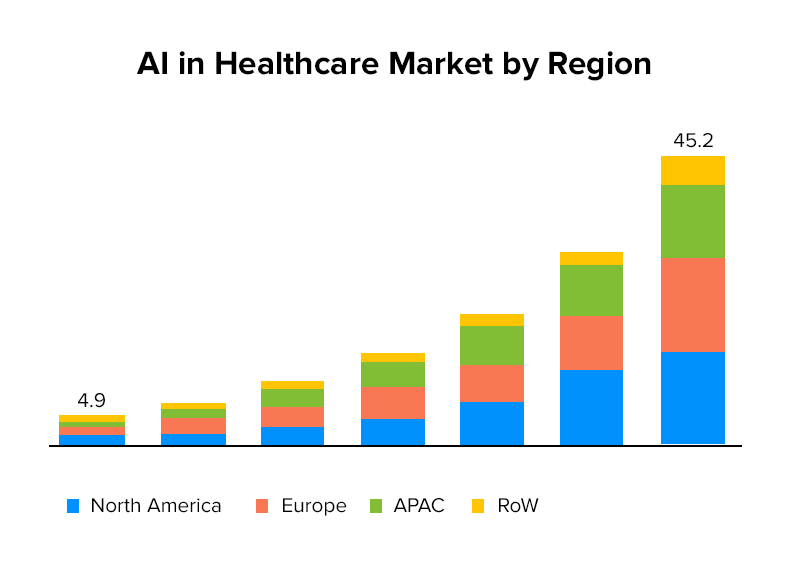
4. Medical Imaging & Diagnostics
One of the advantages of Artificial Intelligence in healthcare is Medical imaging; the process where images of the internal aspects of a body are revealed through a noninvasive process of imaging. This helps in diagnosing and treating disease. Smartphone penetration along with evolved image recognition is making mobile phones as an all-in-one tool for at-home diagnostics. We are also looking forward to FDA approving AI in Healthcare as a medical device.
5. Clinical Trial Enrollment
Enrolling the right set of people is prominent for the success of any clinical trial, and it is not, in any way, an easy process. However, with some assistance from AI Technology, it would become possible to access and extract information from the medical records and then compare them with the ongoing studies. This way, the studies suggested to doctors and patients would be more relevant and reliable.
6. Improved Healthcare Biometrics
With AI’s neural networks, scientists are analyzing the atypical risk factors that were too complicated to quantify. AI in Healthcare wields the power to develop the industry in numerous ways such as by enabling retinal scans, examining and recording skin color changes, and whatnot. AI technology’s proficiency in finding patterns will make possible the unlocking of new diagnostic methods and anticipate unknown risk factors.
7. Efficient Drug Discovery
To put a full-stop on the tediously long drug discovery cycle, traditional pharma organizations are now placing their hopes and faith into new AI biotech startups. Though many startups are on a rudimentary funding stage, they are still swamped by a myriad of clients already. We can see the trend of investment in AI biotech by pharma incumbents continuing into 2020.
Retail/eCommerce and AI
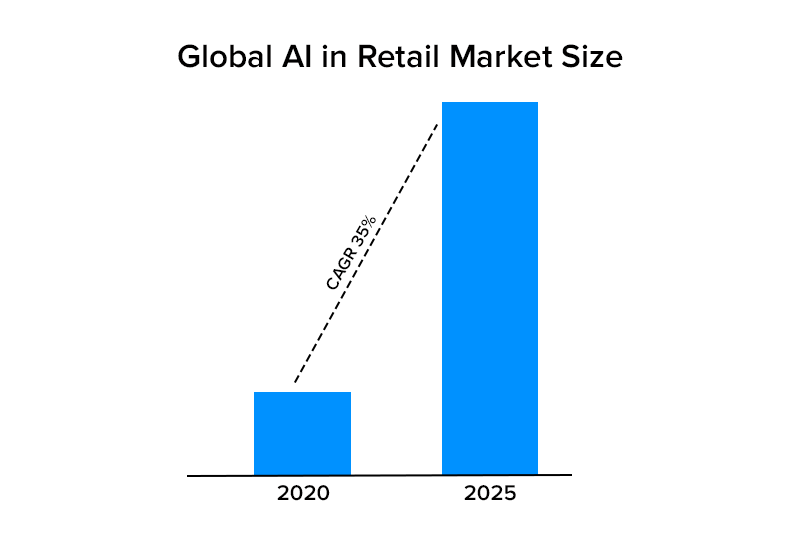
8. Search Technology
One of the biggest benefits of AI―Search technology, is a boon for any business, perhaps it is why many industry incumbents have started to invest in it. Now that the contextual understanding of search terms is no longer in an experimental phase, its global adoption is still a long way. Nevertheless, numerous SaaS agencies are coming forth to deliver search technologies to third-party retailers, and investment in this particular tech stack makes it the latest AI trends of 2021.
9. Retail―Checkout-Free
Companies like Standard Cognition and AmazonGo are the very first players of the Check-out free AI system. Meaning, customers can shop without checking out or scanning the products. This is expected to keep tabs on theft and other problems. The adoption of this AI based system will depend on its deployment and other inventory loss costs due to technical glitches. As of mid-2019, there are 11 AmazonGo stores in operation, going cashier-less.
10. Logistics for Warehouse
Logistics is said to be the developing branch and recent trends in artificial intelligence. In warehouses of the future, logistics will play an eminent role, as the warehouses will be developed to accommodate not humans, but highly proficient robots who will be able to work 24X7 without the need of even basic facilities such as lighting.
{Bonus read: How Much Does On-demand Logistics App Development Costs?}
11. Peer-to-peer Networks
AI Machine Learning requires enormous amounts of data to enable machines to make informed decisions. Peer-to-peer networks, like the ones deployed by cryptocurrencies, offer organizations of all sizes the advantage to run AI programs by channeling the power of networked personal computers. This network amalgamated with AI will promote transparency in search engines.
The global AI market size, i.e. Artificial Intelligence in retail and e-commerce market size is predicted to increase at a CAGR of 42.8% during the forecast period 2019-2025 and acquire a revenue of $19.37 billion by the year 2025.
Government/Public sector and AI
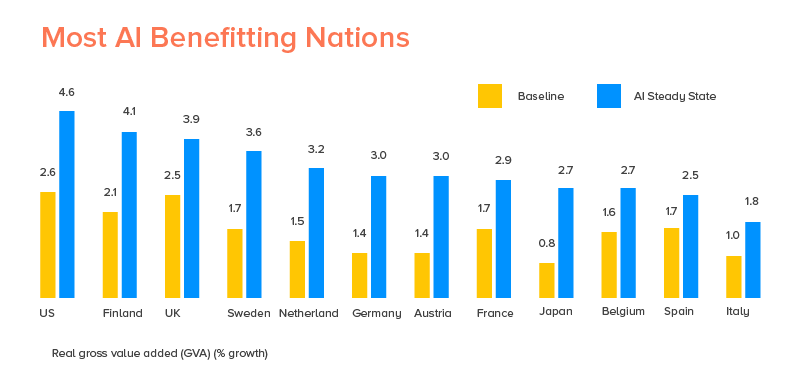
12. Facial Recognition
Facial recognition is a dominant form of biometric authentication. Due to the extensive research in this area, this AI application’s readability and accuracy rate is improving expeditiously. One of the advantages of Artificial Intelligence’s Facial recognition feature is that it will help security agencies in identifying and removing rogue elements from society. Not just this, but businesses are rapidly integrating this AI feature into their apps and other solutions used in processes, according to their business model.
13. Cyber Threat Hunting
Cyber threat hunting is a proactive approach combined with high-security functions, to detect stealth attackers and stop the malicious activities initiated by such hackers. One of the benefits of AI integrated with this technology is that by using machine learning, detecting such foreign elements and security breaches would become a piece of cake.
14. Surveillance via Computer Vision
Computer Vision is an area of AI research which is based on algorithms. A prominent use case of the facility can be seen in the Japanese machine learning algorithm, AI Guardman, which detects suspicious behavior of shoppers and also alerts the store owner on mobile. Similarly, this computer vision added to the drones will help in surveillance of crowded places. AI in the Government sector is expected to rise in the coming future as new ways are about to be explored.
Transportation and AI
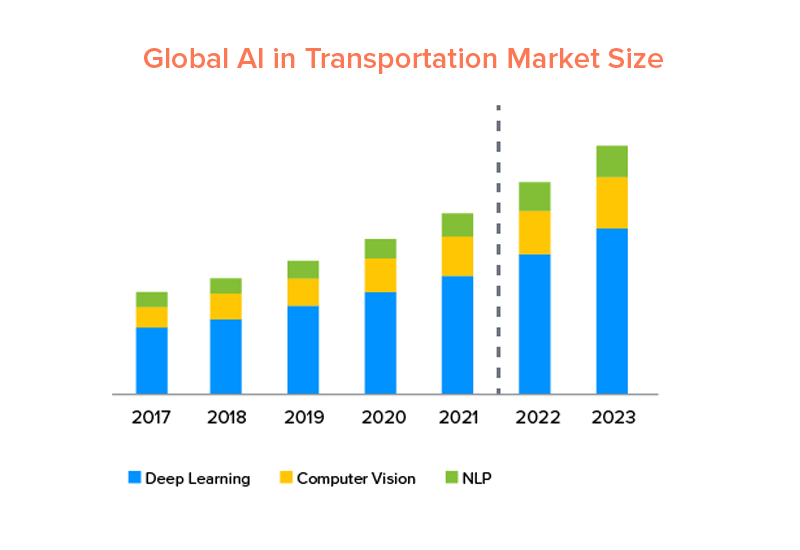
15. Self-driving Vehicles
Self-driving technology will increase AI market size from $54 billion in 2019 to a $556 billion market by 2026, growing at a 39% CAGR, as per a report by Allied Market Research. Moreover, by the year 2025, AI in transportation is estimated to deliver $173 billion in cost savings across the entire automotive OEM supply chain.
16. Traffic Management
AI Technology trends of 2021 also consist of the traffic management with the help of applications that predicted and detected probable traffic mishaps. This was accomplished by transforming traffic sensors into “intelligent” agents using cameras. A successful use case for this is Rapid Flow Technologies.
17. Smart Tracks
Smart Tracks is an initiative started by China, named the ART- Autonomous Rail Rapid transit. This doesn’t require any track as the train follows the virtual track made by painted dashed lines. This astounding artificial intelligence trends is predicted to spread in the coming years, globally.
18. Digital Number plates for Vehicles
Recent trends in artificial intelligence would interestingly enable the smart technology facelift to transport number plates. The digital number plates, created of course with AI technology, will help transport authorities on so many levels, from alerting authorities in case of accidents or use GPS for location detection.
Manufacturing and AI
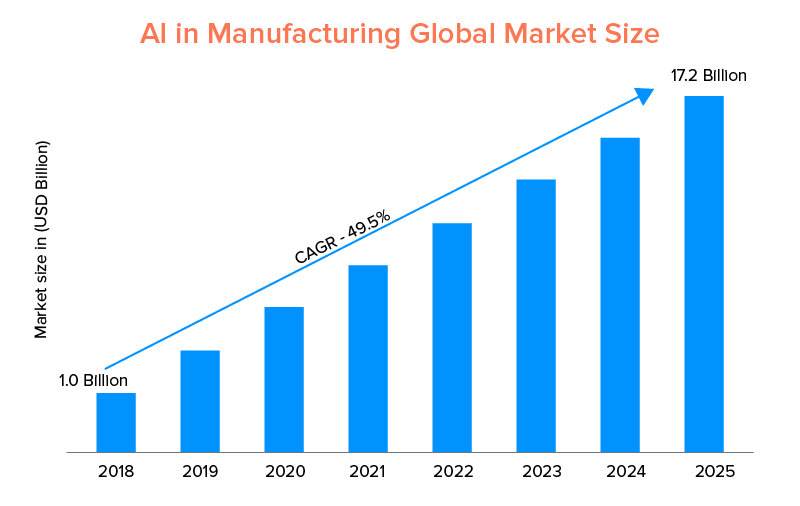
19. Predictive Maintenance & Algorithms
Using the AI algorithms, manufacturers would be able to better predict unanticipated machine failures. This will save millions of dollars for incumbents. The predictive maintenance algorithms deploy constant data collection to forecast equipment failures before they happen. Due to dropped sensor costs, edge computing, AI advancements, and Predictive Maintenance are now more widely available for use.
20. Computer Vision for Defect Detection
We have already discussed how computer vision will help in surveillance. In a similar manner, it will prove as a holy grail for manufacturing industries to supervise their production process and point out even the minutest of discrepancies in the products without the inclusion of human factor. The camera in computer vision is extremely precise in catching defects which are half the width of a hair.
21. Collaboration of Humans and Robots
Though it sounds very futuristic, it is not so much. There will be more than 1.7 million robots deployed in factories around the world by 2020, as per some reports. They would soon work alongside human workers and enhance the productivity level. The AI-powered robots will be designed to take over manufacturing tasks and the human workers will be trained for higher positioned jobs in design, programming, and maintenance.
22. The advent of Quality 4.0
Quality 4.0 is a product of the integration of AI in Manufacturing industry. This involves AI algorithms to notify the manufacturing teams about detected production faults, so that an appropriate action can be taken to stop the production of faulty products and save loads of capital. Said faults can be a deviation from preset recipe, changes in machine behavior, change in raw materials and more.
Gaming and AI
23. Improved Visualization Technology
Recent trends in artificial intelligence are the gaming sector. With the help of deep learning and incessantly growing data at the disposal, AI can improve visual quality in video games. The game environment and characters would become more realistic and seem natural like never before. AI has the quality to highly improve how characters move and express themselves to make the whole gaming experience all the more realistic.
24. Real-world experience with Voice Assistants
Voice Assistants, being a significant branch of AI, are now added to the games such as Destiny 2, where it helps the players access certain game features without accessing the game menu every time. Not just this, but it also offers a wide range of interactive games where the player will not be passive anymore.
25. Personalized Play for Each Gamer
After acquiring the data on individual game players, AI algorithms will enable the developers to create game worlds that are more individualized and reactive to individual players in-game. With future AI technology, we could access MMORPGs that guide players in the direction of quests and other players that compliment their style. A lot is possible in this area, and we are excited to see what will comprise the AI technology trends of 2021.
Business and AI
26. Elevating Customer Experience
As the customers are demanding more facilitated and developed services, businesses are looking to up their game as they certainly do not want to lose customers. Now, AI is taken as an effective technology which is helping several businesses keep their head out of the water.
The future of artificial intelligence in Customer experience is being improved by using Chatbots, 24X7 support, Virtual assistance, and self-help VR systems, as natural-language processing improvises and learns more from the expanding data pool of past experience.
27. Advanced Hiring Process
AI technology solutions such as X.ai and ClearFit can assist recruiters in scheduling interviews and find the most ideal candidate for the job. Now, the recruiting process is not mechanical which is why AI is being developed by adding human factors such as empathy, personality and other human traits that will help the AI algorithm in analyzing and then selecting a candidate just like we humans do. Impact of AI on business is certainly evident and is only expected to rise by 2020.
28. Business Models Transformation
The future of artificial intelligence in business is changing the fundamentals of business functions. The transformation in this sector amounts to the integration of AI features such as Data Analysis, performance prediction, computer vision, and whatnot. With such incredible features at disposal, it is not long that the business organizations will find new and innovative ways to develop this technology into something new and set unparalleled future AI technology trends.
Finance and AI
29. Credit Risk Assessment
In the Finance sector, keeping records on customer data is sort of a second nature. Now, wouldn’t it be amazing if we could use all that data to examine a customer’s record and capacity of paying off loans and credit cards they already possess. AI in Finance is going to do just that and more. Machine Learning and AI are taking the place of a human analyst to determine the risks involved in the financing sector and also provide finance development solutions for them.
30. Easy Fraud Detection
Fraudulent elements are one of the major concerns of the Banking and Finance Industry. To eliminate such risks, AI in Finance uses its machine learning and algorithms to recognise a pattern and if something odd happens, it can detect the discrepancy very easily. For instance, say that a credit card has been used in another country, right after it was used elsewhere, it will alarm the institution to take action. Moreover, it can be developed in a way to recognize what can be considered fraud and what not.
31. Safe Trading with Predictions
Like every other area, trading will also be facilitated with AI’s machine learning and algorithms combined with its other branches. By analyzing the AI market size and conditions from the past data in the cloud, organizations and individuals will be able to overcome unanticipated risks, be it buying or selling of stock and shares.
32. Auto Claims Processing
Many times, Finance companies are faced with a difficult situation where they have to pay the customer for their insurance. To combat the fraud problem and make sure the genuity of the situation, insurers and startups are using AI to compute a vehicle owner’s “risk score”, examine accident imagery, and also keep tabs on driver behavior.
Social Media and AI
33. Improving Social Network
AI plays a pivotal role in making social media platforms what they are. AI in Social media has shaped the whole industry since Facebook adopted AI in 2013. Now, be it finding a friend via neural networks learning to tag to image recognition, or identifying incorrect news, AI does it all.
34. Empowering Marketers
Marketers are leveraging the advantages of AI in Social Media, to understand and analyze the customers’ buying persona and their preferences. This will help them personalize products suggestions based on their buying habits and what drives them to make their decisions.
35. Effective Audience Targeting
Marketers get yet another advantage of AI, which is to expand their campaign beyond linear segmentation and target audience similar to your current client base. Moreover, effective targeting is the trump card for paid ad campaigns across all social media platforms, as the activities of people are stored online. Leveraging the AI technology to access this data will provide them with useful insights on Social media usage, online user behaviors, etc.
36. AI-Supported Content Designing
It is no news that Content is the king in Social Media marketing and optimizing it with AI is the best thing that can happen to this industry. With AI tools studying brands’ pattern of posting content and its type, it can suggest what kind of content is demanded and which content needs to be optimized.
37. AI-Powered Chips become popular
If you thought about the future of artificial intelligence, then you have entered it. Artificial Intelligence depends heavily on specialized processors. Seeing the current demand of AI, chips are being manufactured and integrated with AI Technology to perform functions for which we need separate devices as of now. These chips will be utilized by enabling AI tools in them such as computer vision, speech recognition, and natural language processing.
What Is The Future Of Artificial Intelligence?
After witnessing these incredible AI industry trends, we can pretty much surmise how enormous this AI technology is going to be and the inevitability of it immersing every sector of all industries. Even to date, businesses are using AI to develop next-gen mobile apps to enhance their customer engagement and eventually expand their business.
The disruptive AI technology and artificial intelligence future ideas that organizations are willing to invest heavily in when considering the guarantee it has shown up until now!. We at Appinventiv, we are helping organizations with our AI development company in USA to be at the forefront by implementing AI in their existing tech-structure to reap the benefits and advantages that it brings.
At this point, it is hard to imagine a future without Artificial Intelligence. As 2022 approaches, we are excited to see what awesomeness it will bring to the table.
Frequently Asked Questions (FAQs)
Q. What is the scope of artificial intelligence in the future?
AI industry trends is the latest in which companies are working, and it certainly plays a prominent role in our future. This technology will facilitate us on so many levels and in so many ways from enabling AI-Powered chips which will make travelling token free, to cashier-less shopping marts. You imagine it and AI will do it within a time span of a few years.
Q. Which industries will be affected by AI?
Because of the features AI comes loaded with, almost all of the industries are adopting this technology at their own pace and in their own ways. Industries, namely, Healthcare, Finance, Business, Manufacturing, Retail & eCommerce, Government and Public sector, social media, transportation, and Gaming are reaping the benefits of AI integrated with technologies like IoT, Blockchain, AR, and Cloud.
Q. How Artificial Intelligence Is Transforming Business?
With the advent of AI in business, its core fundamentals changed. Now, it is possible to hire personnel effectively without human involvement, offering better customer services and enhancing customer experience has really evolved by using chatbots and other AI features. Moreover, technologies like computer vision, performance prediction, and data analysis have added to the list of future of artificial intelligence and benefits that businesses are getting with the incorporation of AI technology.

strategies your digital product..
